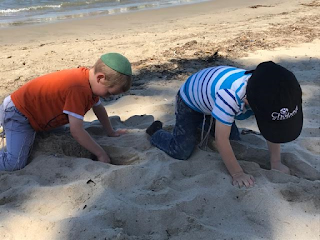Shushan Purim
The holiday of Purim is the 14th of Adar, the day we were saved from Haman's evil plan and the battle was won. In the city of Shushan (where the King and Queen resided) it was more populated and the battle lasted an extra day. In Jerusalem till this day they celebrate two days of Purim while we celebrate 'Shushan Purim".
The children came to school dressed up and had fun dancing and playing piñata!
To help the children 'say goodbye' to Purim we invited them to help organize our Purim box.
This was a great way to connect and review all their good memories till next year.
This started off our 'Big idea' for this week, to learn together organization and cleanliness skills. These are life skills we hope the children take with them.
Throughout our whole day together we have many opportunities to teach organization and create habits to help them as they get older.
For example, Rozie knows the first thing she does when entering the classroom is to put all her belongings into her cubby.
This week we tried to add different techniques to help in this area.
Evan helped us learn how an empty snack bag can become the 'trash' for peels, wrappers etc.


Our block center gets a face lift!
Building with blocks provides one of the most valuable learning experiences available for young children. Block play stimulates learning in all domains of development, intellectual, physical, and social-emotional and language. The current research shows that block play is fundamental for later cognitive success for learning math and numbers. Our blocks are defiantly kept busy in our class but it was starting to look a bit messy.
First, Dovi and Yisroel helped remove any papers that were taped on from previous units.
Yisroel "Now it is messier, how are we cleaning?" This was such a great observation and question. We talked about the process of organizing and cleaning.
Organizing became a shape lesson as we traced the different block shapes on each of the cubbies.
The children quickly realized how much more pleasant it was to play and build as well as the clean up process each day.
Puzzles being organized.
It is so important to play in a clean environment. Our toys get washed periodically but it is so much more fun to get the children involved in this process and appreciate how to keep our toys clean.
Our felt story folders needed some organizing. Muka and Menucha divided them into people, animals and props.
Mini Laundry Mat
Doing the laundry was a fun life skill center that the children were invited to role play. Two boxes became the washer and dryer and our spare clothes in our classroom got to get cleaned, dried and folded up on the shelves!
Rozie learning how to poor 'just enough' and remembering to close the lid tight when she was done.
Levi drying his clothes by the clothes line! He shared with us how his Imma does this at home!
We even learned how to separate the dark and light clothes ;)
Discovering different folding techniques.
Clothespins are a great fine motor activity since it is quite challenging pinching them open and hanging up clothes!
Saige first practiced how to get it on the string and Evan felt so proud when he figured out how to open it! "I have strong fingers!" he announced.
Sequencing and Daily living
We have countless opportunities throughout the day to encourage children to think sequentially. In the car on the way home, ask, “Which way will I turn at the stop sign?” At home ask, “Now, what will I do with these dirty dishes?” “Tell me what happened at school today,” or “Before you go outside in the cold, what do you need to do?” The list is unending.
Sequencing is an important skill in pre-reading, comprehension, and writing. Starting the children early helps build a solid foundation for learning.
Sage enjoyed playing a sequence game.
Following instructions is a part of everyday life. Following instructions requires the child to attend to detail in spoken language, to sequence the information in the appropriate steps and to seek clarification if they have trouble remembering or recalling the information.
We did an activity for the children to practice different levels of following instructions.
The younger children got the opportunity to look at a picture while listening to their instruction.
"Menachem can you find the person on the pretend lake in our classroom?"
"Mimi can you find this book and bring it to Morah?"
For the older children the instruction sounded like this; "Menucha can you please bring a vegetable that is not red or green?"
Happy Birthday Morah Keren!
Elizabeth helped decorate a special card for a special morah!

































































